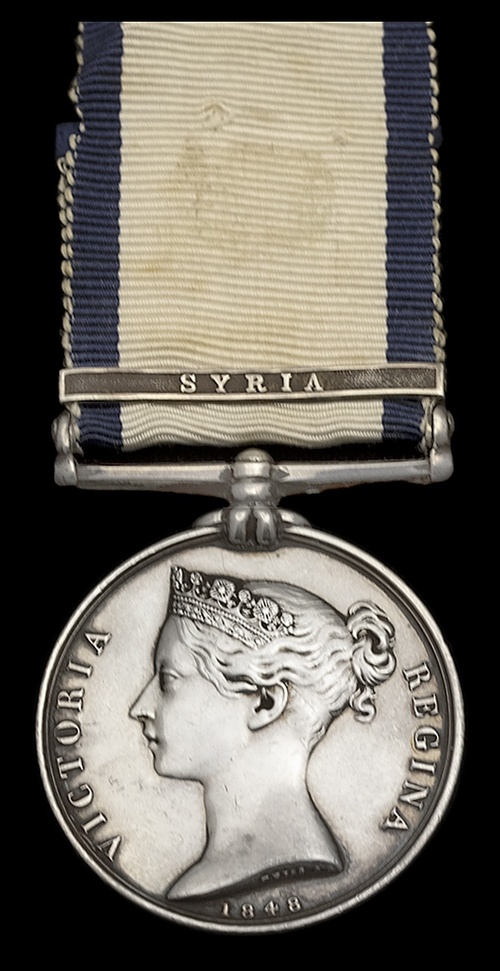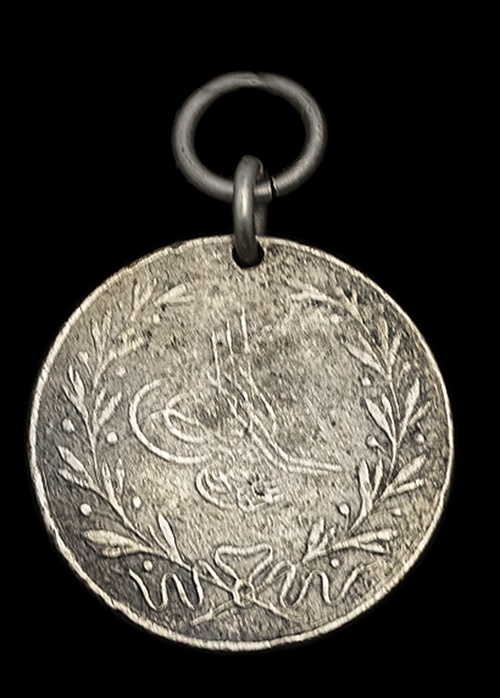Auction: 24003 - Orders, Decorations and Medals
Lot: 12
The Naval General Service Medal awarded to Paymaster-in-Chief A. A. Speed, Royal Navy, whose 30-year career saw him serve across the globe and rise through the ranks from his beginnings as a humble Clerk to Paymaster-in-Chief
Naval General Service 1793-1840, 1 clasp, Syria (Arthur A. Speed, Clerk.), lightly polished, one minor edge knock, nearly very fine
Provenance:
Sotheby's, January 1971.
Arthur Andrews Speed was born on 20 June 1819 and family influence likely led to his choice of career; his father John Speed had been a Clerk aboard H.M.S. Renown during the Egypt campaign of 1801 and was Purser on the 84-gun second rate H.M.S. Asia during operations off the coast of Syria. This must surely be an unusual example of father and son serving aboard the same ship during the same campaign, and Speed senior also lived to claim a two-clasp Naval General Service Medal.
Speed, the younger, is believed to have joined Asia while his father was still aboard acting as Purser. Speed would have seen action quite quickly, with Asia joining the Egyptian-Ottoman conflict in 1840 where she was tasked with keeping maritime mail communications open along the Syrian coast. During these hostilities, Speed was recorded as serving on board as Clerk.
Asia returned to England and was paid off at Sheerness in April 1841 after the close of the conflict, with Speed there being appointed Clerk aboard guard ship H.M.S. Ocean that December. He remained with Ocean until December 1844, when he joined 10-gun sloop H.M.S. Rolla, with whom he was posted as 'Clerk in Charge'. Rolla became involved with the yellow fever epidemic at Madeira in 1845 when it encountered steam sloop H.M.S. Éclair, an anti-slavery patrol ship. Éclair was devastated by an outbreak of yellow fever on board and Rolla's surgeon offered his services to the crippled sloop, accompanying it back to Portsmouth. Rolla also transported the British Consul from Éclair to his shore destination of Boa Vista, where a third of the inhabitants were to perish from the fever.
Luckily, Rolla was spared from a similar outbreak and safely returned to England. Once back home, on 5 April 1846 Speed joined the 8-gun brig sloop H.M.S. Heroine, listed as 'Assistant Paymaster'. Heroine was an active member of the suppression of slavery, participating in the successful detention of at least nine slave ships between 1846 and 1848. Speed was later paid off of Heroine when she arrived in Devonport on 20 December 1848.
Speed was seemingly unemployed for the following six months until becoming Acting Purser aboard the 8-gun warship H.M.S. Swift. Swift is notable for transporting the Irish Revolutionaries known as the 'Young Irelanders' to their detention on Van Diemen's Island, Tasmania. The Young Irelanders staged an armed rebellion in County Tipperary in July 1848 in protest of the British Government's response to the Irish Potato Famine. Some of the most prominent revolutionaries, including William Smith O'Brien and Patrick O'Donoghue, were put to trial and charged with treason the following October. They were sentenced to life at the Van Dieman's Land penal colony, with Swift charged with their transportation. Both O'Brien and O'Donoghue wrote about their experiences aboard Swift.
O'Brien wrote of his journey: "Upon the whole, my recollections of the HMS Swift are far from being as painful as might be expected. It is true that it was the medium by which I was torn from the home and from the country which I dearly love. It is true that I found our long voyage monotonous in the extreme. It is true that much that was painful in retrospect of anticipation tended to add gloom to that monotony, but upon the other hand I had the satisfaction of feeling that the voyage was much less disagreeable than it might have been under less favourable circumstances."
O'Donoghue's account conjures images like those of a classic maritime novel: "18th July… Not a ripple on the water, hundreds of porpoises, crew danced a hornpipe accompanied by a fiddle…. 31st July, Off Sierra Leone, saw a star like meteor flash."
Swift arrived back in England in September 1850, with Speed listed as Paymaster on the return journey. Two years later, Speed joined the newly commissioned 6-gun paddle sloop H.M.S. Argus, who served on the North American and West Indies station. Speed requested a transfer upon his return to Portsmouth, where Argus docked on 25 February 1854. Just three days later, Speed joined the 20-gun fourth rate H.M.S. Calypso. He served with her until 19 July 1855, after which time he was enlisted as Paymaster of the 21-gun screw corvette H.M.S. Pearl on 22 December. She intended to sail for South America and was part of Queen Victoria's fleet review on 23 April 1856, ahead of setting sail abroad on 30 May. In 1857, Pearl was ordered to search for the Peruvian gunboats Loa and Tumbes, which had attacked and robbed a British Mail Steamer. On 28 March Pearl sighted the gunboats, boarded them, and successfully ordered their immediate surrender, afterwards conveying the captives to Callao.
Upon the outbreak of tensions resulting in the Second China War of 1857, Pearl was ordered to Hong Kong where she arrived on 10 May 1857. There, she participated in only one action against the enemy in which she destroyed some enemy Junks. Soon after arriving in China, Pearl together with H.M.S. Shannon and H.M.S. Sanspareil, was quickly ordered to India to assist in Indian Mutiny operations. She was of further service en route to India, stopping in Singapore to pick up two companies of the 90th Regiment of Foot, disembarking them at Calcutta on 12 August. Whilst Pearl was berthed by Calcutta, the next year in June 1858 Speed was recorded as having fallen ill. The specific circumstances of this illness are unknown, but serious enough that in the same month Speed was invalided back to England aboard the H.M.S. Simoom for 'the preservation of his life'.
Speed was returned to England and discharged from Simoom on 28 October, and did not return to Naval employment until 25 May 1859 when he was commissioned Paymaster aboard 90-gun second rate warship H.M.S. Aboukir. She joined the Channel Fleet that August with Speed being advanced Paymaster Second Class later that year. Speed served with her until transferring to 74-gun blockship H.M.S. Hawke at the Coast Guard Station in Cork Harbour on 1 June 1861. Hawke was directed to be on guard against ships trying to interfere with American commerce because of the American Civil War, in which some Confederate sympathisers attempted to carry contraband goods in and out of the Southern states.
Speed was listed 'for shore service' on 31 May 1864 and joined Coast Guard ship H.M.S. Pembroke on 4 July 1866. At some point, Speed took on his final appointment as Paymaster aboard Coast Guard ship H.M.S. Penelope. Speed only appears on her muster list for eighteen days before being removed to the retired list with the rank of 'Paymaster-in-Chief', having served for nearly 28 years in the Royal Navy. After his retirement, Speed is recorded as having lived at Ladbrooke Villa, Shirley, Southampton and later died at age 71 on 21 April 1891.
Sold together with an associated St. Jean d'Acre Medal, silver, pierced with rings for suspension, this worn poor, and a comprehensive bound file of copied research.
Subject to 20% VAT on Buyer’s Premium. For more information please view Terms and Conditions for Buyers.
Sold for
£950
Starting price
£950







